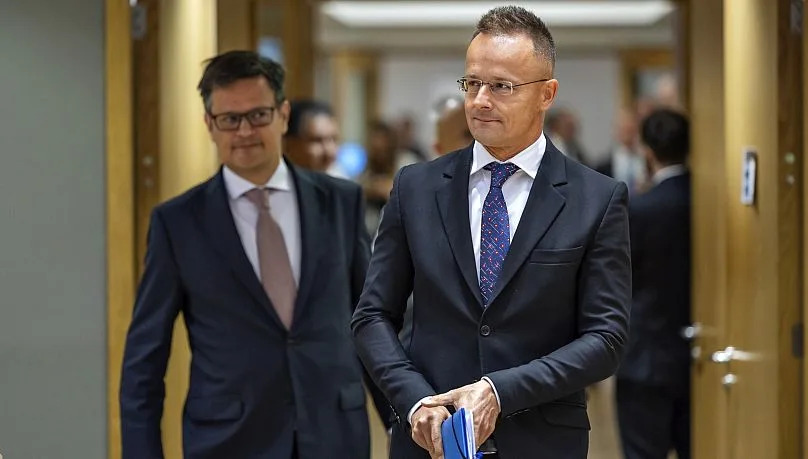Hungarian Foreign Minister Peter Szijjarto
Hungary will block European Union refunds for member states that gave munitions to Ukraine until Kyiv allows the transit of oil from Russia's Lukoil through a pipeline over its territory, the Hungarian foreign minister said on Tuesday.
Slovakia and Hungary said earlier this month that they had stopped receiving oil from Lukoil through the Druzhba pipeline after Ukraine imposed a ban last month on the transit of resources from Lukoil.
Also in response to the situation on Tuesday, Hungary's energy ministry convened a working group concerning the security of supply, which "reviewed the steps taken so far and possible next steps," a statement by the ministry read.
"As long as this issue is not resolved by Ukraine, everyone should forget about the payment of the 6.5 billion euros of the European Peace Facility (EPF) compensation for arms transfers," Foreign Minister Peter Szijjarto was quoted as saying by broadcaster ATV.
Ukraine's foreign ministry did not immediately respond to a request for comment. Kyiv says it has blocked oil from Lukoil but overall flows have not been reduced through the pipeline, which also serves other suppliers.
The Druzhba, or "friendship", oil pipeline linking Russia to former socialist bloc states in eastern Europe has remained functioning through more than two years of war, even as the EU weaned itself off most other sources of Russian energy supplies. Hungary in particular has remained notably dependent on Russian oil and says it cannot supply its refineries without it.
Hungary and Slovakia asked the European Commission on Monday to mediate a consultation procedure with Ukraine. The procedure would allow for the issue to go to court unless the EU executive body acts within three days.
The EPF, created in 2021, operates as a cashback scheme that gives EU members refunds for sending munitions to other countries.
Since Russia's invasion of Ukraine in 2022, member states that gave weapons to Ukraine can ask for compensation from this fund. But Hungary has been blocking the disbursement of the next tranche of EPF money for more than a year, citing various issues.
AfriPrime App link: FREE to download...
https://www.amazon.com/Africircle-AfriPrime/dp/B0D2M3F2JT
Brussels ready to mediate between Hungary and Ukraine in spiralling oil dispute
The European Commission is prepared to mediate in the spiralling dispute between Hungary and Slovakia, on one side, and Ukraine, on the other, over the latter's decision to strengthen sanctions against Lukoil, a Moscow-based corporation, and consequently restrict the transit of Russian crude oil through its territory.
Kyiv argues the penalties are necessary to curtail the Kremlin's revenues that sustain the military invasion, now well into its third year. But Budapest and Bratislava have furiously snapped back, complaining the disruption in energy supplies threatens their economies.
In a joint letter, both countries have asked the Commission to intervene and launch a consultation procedure under the EU-Ukraine Association Agreement. Brussels has acknowledged the petition and insists any proceedings, if any, will be initiated by the executive itself, which has exclusive competence on commercial policy.
"We are currently studying the contents of this letter and gathering more information before taking any decision," a Commission spokesperson said on Tuesday. "At the moment, there is no immediate impact on the security of oil supply to the EU."
A meeting of the trade policy committee will take place on Wednesday at the request of Hungary and Slovakia, which will help to "assess the facts."
"The Commission stands ready to support the impact on member states and find a solution together with Ukraine," the spokesperson added, noting Kyiv will also be involved in the discussions.
The joint letter was sent on Monday as the bloc's foreign affairs ministers gathered for a meeting with the Russian aggression at the top of the agenda. Hungary's representative, Péter Szijjártó, used the occasion to raise the topic with his peers.
"We have told Ukraine's authorities that it has been an incomprehensible, unacceptable and unfriendly decision," Szijjártó said in a statement.
"It is strange that a country aspiring to be integrated with the EU is seriously jeopardising the energy supplies of two member states."
His Slovak counterpart, Juraj Blanár, was equally critical and said the restrictions placed on Lukoil supplies represented a "clear violation" of the Association Agreement.
"We refuse to be a political tool," he wrote on Facebook. "We will resolutely defend ourselves and use all the possibilities of European law."

With tensions running high, Hungary and Slovakia warn that if the EU-led mediation fails to deliver a satisfying answer, they will take Ukraine to court.
Hungary and Slovakia are, together with Czechia, exempted from an EU-wide ban that prohibits the purchase of Russian crude oil. The derogation, famously pushed by Viktor Orbán in a high-stakes summit, allows the three landlocked states to receive oil supplies through the Druzhba pipeline, which travels from Russia to Central Europe.
Lukoil is the main player along the pipeline but not the only one: Tatneft, Gazprom Neft, Russneft and other small-sized firms also use the route. According to Reuters, the pipeline's southern branch carries about 250,000 barrels of Russian oil every day. The top buyer is the MOL Group, which operates refineries in Slovakia and Hungary.
"The EU sanctions, which we have disputed on several occasions, and which in this case have again been shown to have a greater negative impact on Slovakia and the EU than on Russia itself, clearly state that Slovakia has an exemption for oil imports until the end of the year," Blanár said in his statement.
"The Ukrainian side has prevented us from exercising this exemption."
The spat comes on the heels of Orbán's self-styled "peace mission," a series of unannounced visits that saw the Hungarian premier travel to Kyiv, Moscow and Beijing to discuss an end to the Ukraine war. His meeting with Vladimir Putin proved enormously controversial and has fuelled a growing boycott against Hungary's six-month presidency of the EU Council, which began on 1 July.
In an interview with local media, Szijjártó linked the oil dispute with Hungary's protracted veto on EU military assistance to Ukraine, which has prevented the release of €6.5 billion in reimbursements that other member states are due.
"As long as this issue is not resolved by Ukraine, everyone should forget about the payment of the €6.5 billion in compensation for arms transfers," Szijjártó said. "Because what would the payment of €6.5 billion look like? We contribute while Ukraine threatens the security of our energy supply."
AfriPrime App link: FREE to download...
https://www.amazon.com/Africircle-AfriPrime/dp/B0D2M3F2JT
Hungary's foreign minister indifferent to shift of EU meeting away from Budapest
Hungary's foreign minister voiced indifference on Tuesday over a decision by the European Union's top diplomat to shift an EU ministers' meeting from Budapest to Brussels in a sign of disapproval over Hungary's initial use of the EU presidency.
"It was all the same to me in the beginning, and it's all the same to me now," Peter Szijjarto said in a statement.
EU foreign policy chief Josep Borrell acted after Hungarian Prime Minister Viktor Orban began a self-styled Ukraine peace mission by holding talks with Russian President Vladimir Putin and U.S. Republican presidential candidate Donald Trump.
Orban, a nationalist who has often been at odds with broader EU policy, embarked on his quest without coordinating it with other EU government leaders or Ukraine just days after Hungary took on the 27-bloc's rotating presidency on July 1.
"We have to send a signal, even if it is a symbolic signal," Borrell told reporters in Brussels on Monday after the last meeting of EU foreign ministers before the summer break.
Borrell said there had been no consensus among EU members over whether to attend the ministerial meeting in the Hungarian capital Budapest, planned for Aug. 28-29 - and a gathering of defence ministers afterwards.
He said he opted to switch both meetings to Brussels given that a majority of countries wanted to send a message to Hungary over Orban's outreach to Russia, which is subject to EU sanctions over its 2-1/2-year-old invasion of Ukraine.
AfriPrime App link: FREE to download...




